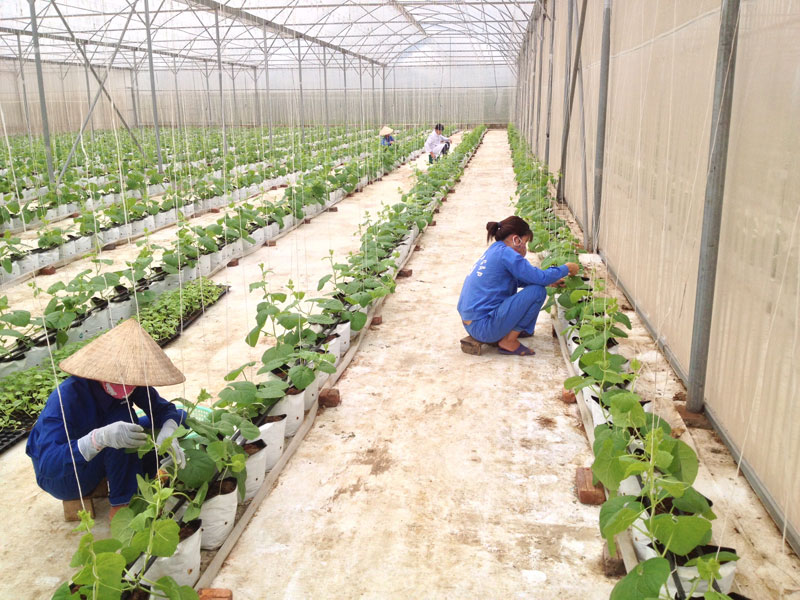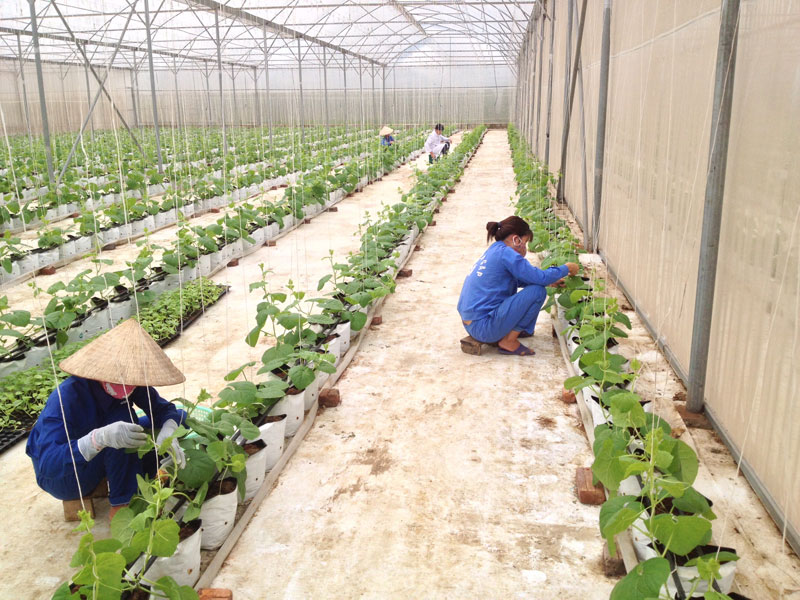
(HBO) - Achievements made by Hoa Binh province in building new-style rural areas provide an important momentum and a springboard to help the locality achieve better results in the future.
Hoa Binh GAP One-member Limited Company in
Thanh Ha town of Lac Thuy district is a hi-tech agricultural production model,
helping create jobs and stable incomes for a dozen of local labourers.
Stories of people who donated money and land
for building roads and communal houses are no longer new in Hoa Binh. Visiting
new-style rural communes now, we can easily hear local residents talk about how
to do business and improve the living standard. The consensus and unity among locals to
support each other in reducing poverty and getting rich demonstrate the effectiveness
of new-style rural development in Hoa Binh.
In both communes that have already met all criteria in the National Target
Programme on New Rural Development (NTP-NRD) or those which are still striving
to be recognised as new-style rural areas, basing on the planning of concentrated production areas, the
localities have implemented many models and projects for production development
and vocational training; and promoted the transfer of science and technology to
help local farmers expand commodity-scale production.
So far,
Hoa Binh has 51 communes recognised as new style rural areas. On average, the province’s communes have
fulfilled 12.62 criteria. No commune met less
than 7 criteria.
The rural areas have got a complete
facelift, and gradually developed in line with the plan, with 100 percent of
communes in the province completing the overall development plan and the
production development plan. Locals’ living standards have been better.
The achievements in agriculture production
and new-style rural development have created remarkable, basic and
comprehensive changes in terms of politics, socio-economy, quality of life and the
environment in rural areas.
The material and spiritual life of people living in rural areas have improved remarkably.
Average income per capita in rural areas in 2018 is estimated at 24.8 million
VND; the rate of poor household has dropped to over 21 percent.
The work of public health has shown great progress
as the quality of medical examination and treatment has been improved. All communal
medical stations in the province have doctors.
Cultural institutions, educational facilities and socio-economic infrastructure
systems have received investment, resulting in improved quality and efficiency
of their operation./.
According to data from the Hoa Binh Provincial Party Committee, the industrial production index for the first six months of 2025 is estimated to have increased by 20% compared to the same period last year. This marks the highest year-on-year growth rate for this period since 2020.
In the first six months of 2025, Hoa Binh province’s export turnover was estimated at 1.145 billion USD, marking an 18.11% increase compared to the same period in 2024. Import turnover was estimated at $ 804 million, a 17.15% increase, which helped the province maintain a positive trade balance.
The lives of the ethnic minority farmers in Tan Lac district have gradually improved thanks to the new directions in agricultural production. This is a testament to the collective strength fostered through the professional associations and groups implemented by various levels of the district’s Farmers’ Union.
With the motto the "product quality comes first,” after nearly one year of establishment and operation, Muong village’s Clean Food Agricultural and Commercial Cooperative, located in Cau Hamlet, Hung Son Commune (Kim Boi district), has launched reputable, high-quality agricultural products to the market that are well-received by consumers. The products such as Muong village’s pork sausage, salt-cured chicken, and salt-cured pork hocks have gradually carved out a place in the market and they are on the path to obtaining the OCOP certification.
In the past, the phrase "bumper harvest, rock-bottom prices" was a familiar refrain for Vietnamese farmers engaged in fragmented, small-scale agriculture. But today, a new spirit is emerging across rural areas of Hoa Binh province - one of collaboration, organisation, and collective economic models that provide a stable foundation for production.
Maintaining growing area codes and packing facility codes in accordance with regulations is a mandatory requirement for agricultural products to be eligible for export. Recently, the Department of Agriculture and Environment of Hoa Binh province has intensified technical supervision of designated farming areas and packing facilities to safeguard the "green passport" that enables its products to access international markets.



